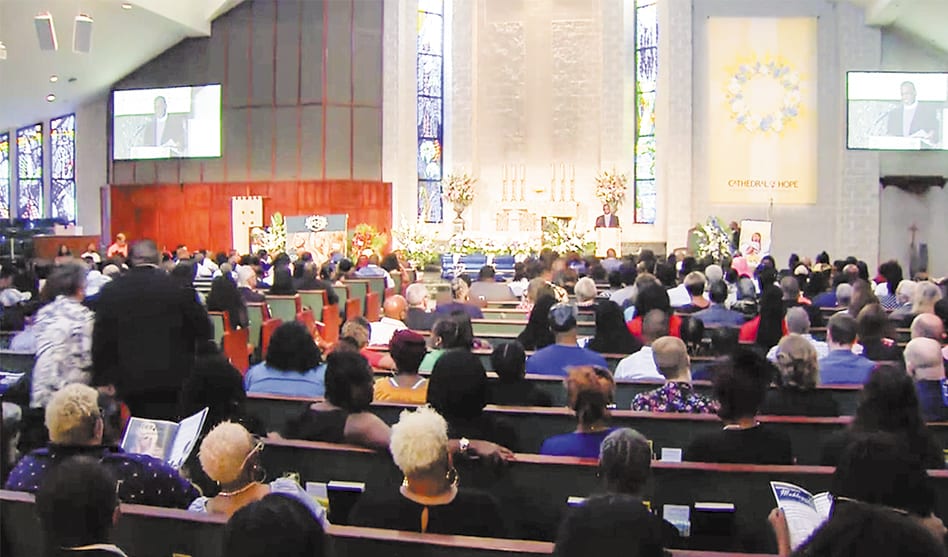As the trans community mourns, the federal government takes away rights and protections
DAVID TAFFET | Senior Staff Writer
taffet@dallasvoice.com
Hundreds of people gathered at Cathedral of Hope on Tuesday, May 28, to pay tribute to Muhlaysia Booker, the Dallas transgender woman who made national headlines when video of several men attacking her as a crowd of onlookers laughed and jeered went viral and who was then murdered just a month later.
Booker is one of five black trans women murdered in 2019. The investigation into her murder is ongoing, with police indicating her murder may be related to the October murder of Brittney White and the stabbing in April of another trans woman, who survived.
Bishop Alex Byrd on Tuesday praised Booker’s family for allowing Muhlaysia to be honored in the way she would have chosen — as a transgender woman. And he asked those, especially from the LGBT community, to “respect the right of each person to mourn in the way they need” and not criticize if someone who’s grieving uses an incorrect pronoun.
The Rev. Neil Cazares-Thomas of Cathedral of Hope set the tone when he said, “God makes no mistakes and loves us the way we are.”
Resolutions read at the service included one written by state Rep. Jessica Gonzalez, D-Dallas, that adjourned the 886th session of the Texas House of Representatives in memory of Booker. A city resolution from Mayor Mike Rawlings, who attended the funeral, and a state Senate resolution written by Sen. Royce West were also read aloud.
“Remember the name Muhlaysia Booker, because I will never forget it,” West wrote in the Senate resolution.
Booker’s mother, Stephanie Houston, received several standing ovations as she told the crowd about her child’s transition and her acceptance of Muhlaysia. “It’s disrespectful to bury your body the way you were born rather than the way you lived,” Houston said. “What she was sent here to do, she did.”
While Houston lamented that Booker’s life was taken when she had been living just three years as an openly trans woman, she also said, “If you don’t have something to die for, you’ve never lived.”
Trans rights under assault
As Booker and other trans women are being attacked and killed in the streets, the federal government under the Trump administration has launched attacks on the rights of transgender Americans by changing rules and policies to make the lives of trans men and women more difficult and more dangerous.
A recent change to the Affordable Care Act removes protections for people seeking medical care by removing gender identity and sex stereotyping as protected categories. Under the change, a doctor, hospital, clinic, EMT, insurance company, state Medicaid program or other healthcare provider can deny life-saving healthcare to someone because they dislike the person’s gender identity.
Another new Trump administration policy makes it almost impossible for trans men and women to serve in the military. Since 2016, transgender people have been allowed to serve with about 15,000 trans troops currently serving. As of March, they are no longer welcome.
Transgender military personnel may no longer transition while serving and must serve in their gender assigned at birth. As of April 12, no one taking hormones may enlist. Those already serving will no longer be allowed to take hormones or get gender-affirming surgery.
And a change in HUD guidelines removes protections for transgender people at homeless shelters. The day after HUD Secretary Ben Carson told members of
Congress that Obama-era protections for trans people in shelters would remain in effect, the rules changed.
For a number of years, the Salvation Army in Dallas has welcomed the transgender community although, around the country, the organization is not known for welcoming the LGBT community. Locally, it plans to maintain and even expand those services.
In contrast to U.S. government rulings, the World Health Organization has removed gender nonconformity as a mental disorder. What was gender identity disorder is now called gender incongruence. That allows someone who is transgender to seek medical care without being classified as having a mental problem. Among medical and psychological experts, experiencing a gender different from the gender assigned at birth is a natural variation of human experience.













